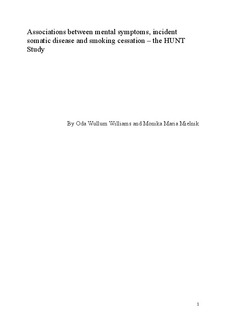| dc.description.abstract | Objective: To assess the association of demographic variables, socioeconomic status, mental symptoms, incident somatic disease and lifestyle and smoking cessation. Methods: We used a longitudinal data set extracted from the second (1995-1997) and third wave (2006-2008) of the Nord-Trøndelag Health Study (HUNT2 and HUNT3, respectively), which includes data from questionnaires, interviews and clinical measurements. Our study sample consisted of those who smoked in HUNT2, and also participated in HUNT3 (9554 individuals). Associations between the different independent variables and smoking cessation were estimated using logistic regression. We assessed possible effect measure modification between mental symptoms and incident somatic disease. Results: Men, older participants and those with higher education were more likely to quit smoking compared to women, younger and the lower educated. Participants with symptoms of depression had an odds ratio (OR) of 0.76 (95% confidence interval (CI): 0.60-0.96) for smoking cessation, compared with those without depression. Incident cardiovascular disease for those without mental illness was associated with smoking cessation (OR: 2.08. 95% CI: 1.77-2.45), as was incident pulmonary disease (OR: 1.57. 95% CI: 1.18-2.08). Also for those with symptoms of mental illness, incident cardiovascular disease had a strong association with smoking cessation. Pulmonary disease did not show the same strong association. Increased alcohol intake and a problematic drinking pattern was associated with reduced likelihood of smoking cessation. Conclusions: Symptoms of either depression or comorbid depression and anxiety were associated with increased risk of smoking continuation. Although incident somatic disease increased likelihood of smoking cessation, smoking cessation after incident somatic disease was less common among participants with mental symptoms compared to those without mental symptoms. These results might indicate the need of targeted smoking cessation interventions in people with mental health problems. | nb_NO |
